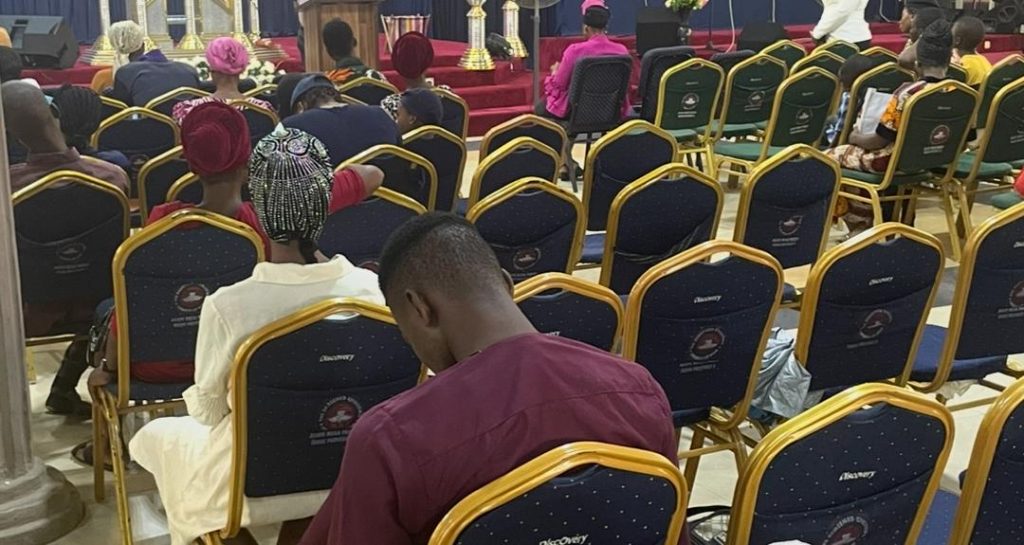
In this evidence-based blog essay, IDVRM Research Associate Fisayo Onaseso presents findings from novel research that she conducted with women experiencing domestic violence and religious and traditional leaders in their communities in Lagos, Nigeria. The study explored how religious and cultural beliefs can either support or discourage attitudes and behaviours that maintain domestic violence and how these beliefs may be redefined to reduce tolerance for domestic abuse in Nigeria. Fisayo’s research suggests that religious and cultural beliefs can both discourage and perpetuate attitudes and behaviours that maintain domestic abuse. While religious and cultural value systems can foster respect and dignity in marriage, their misuse by many in the faith community can silence women and can prolong their suffering.
Contextualising Domestic Violence in Nigeria’s Religious and Cultural Context
According to a 2020 report by Health Watch Nigeria, 69% of Nigerian women have experienced physical, sexual, or emotional abuse (see here). Between August 2022 and July 2023, 5,624 cases were reported to the Lagos State Government (see here). The Lagos State Domestic and Sexual Violence Agency (DSVA) received over 4,800 cases between September 2021 and July 2022, with 50% reported by women after over a decade of marriage (see here).
Discussions about the causes of and responses to domestic violence in Nigeria often intersect with ethnicity and religion. Religious and cultural beliefs significantly shape politics, cultural life and social norms in Nigeria, a country of over 200 million people (see here), who identify as predominantly Christian (approx. 74.4 million), Muslim (approx. 104.7 million), or followers of ‘African Traditional Religion’ (see here). With over 250 ethnic groups, Nigeria is deeply diverse, with cultural and religious values holding a significant role in everyday life (see here).
Despite laws such as the Violence Against Persons Prohibition (VAPP) Act of 2015, harmful social norms and unhelpful attitudes persist and domestic violence remains a critical issue. Often, religious and cultural beliefs are invoked to justify abuse or to discourage survivors from leaving abusive relationships. For instance, Christian teachings on male headship (Ephesians 5:23) are frequently misinterpreted to suggest that wives must endure difficult, and even abusive, husbands. Similarly, Surah An-Nisa 4:34 in Islam is used to justify male control, and sometimes abuse, over women. While many religious leaders reject these interpretations, these understandings are still widespread among perpetrators and community members, and this is simply the reality on the ground.
Methodology
To understand how cultural and religious beliefs affect experiences and perceptions of domestic violence, I conducted semi-structured interviews with 34 women who had been or were at the time of the study experiencing domestic abuse (18 from Lagos Mainland, 16 from Lagos Island), six religious leaders (three Islamic, three Christian) and six traditional leaders (representing Yoruba, Igbo, Hausa, and Fulani ethnic groups). All participants were Lagos residents and were survivors of domestic violence and active leaders in their communities, respectively.
The inclusion criteria specified that participants must be a) aged 18+, b) resident in Lagos, b) practising Christians or Muslims, c) originating from Nigeria’s four main regions (North, South, East and West), d) currently experiencing or having previously experienced domestic violence. and e) be in active counselling and approved by their counsellors to participate in the research. An overview of the participants’ profiles is given in the tables below.
Table 1: Participant Profiles
| Category | Lagos Mainland | Lagos Island | Muslim | Christian | Cultural Background | Relationship Status |
| Women Survivors | 18 | 16 | 15 | 19 | 11 (West) 9 (East) 7 (North) 7 (South) | 18 married 12 traditionally married 4 engaged |
| Religious Leaders | 3 | 3 | 3 | 3 | 2 (West) 2 (East) 2 (North) | n/a |
| Traditional Leaders | 3 | 3 | 3 | 3 | 2 (West) 2 (East) 2 (North) | n/a |
Ethical Considerations
The research was conducted independently from an academic institution but followed rigorous ethical standards in domestic violence internationally. Participants were informed of the study’s objectives and their rights. All consented to participate with the option to withdraw at any time. Interviews were conducted in churches, mosques, markets and other public areas to avoid suspicion by abusive partners and to minimise the risks of being overhead by an abusive partner in a private setting. I also reflected on how best to conduct the research safely for the domestic violence survivors. Before embarking on the research, I consulted with religious leaders and counsellors (including those mediating marital conflict) based in Lagos on how best to conduct the research without putting the participants at risk from the perpetrators or re-traumatisation. The counsellor advised that only participants undergoing counselling should participate in the research with approval from their counsellors. Hence, only participants who were undergoing counselling and had the approval of their respective counsellors participated in the study. When obtaining consent, all the study participants agreed to participate in the study and to share their experience and perspective.
Throughout the interview sessions with the survivors, I was careful not to offer any form of advice that would contradict the guidance that the participants were receiving from their counsellors. During the interview sessions, I ensured not to digress from the questions, and I frequently asked if the participants were comfortable or needed a break or to stop the interview altogether. Some participants expressed emotions of regrets, relief, concern and appreciation at different points during the interview sessions. The women I spoke to invariably reported that they were glad to share their experience because they felt that the lessons from their experiences might benefit someone else, serving as encouragement or a source of strength to people who have been abused or going through abuse. In my interviews with religious and community leaders, I found some participants slightly argumentative in their responses, but they all shared their opinions respectfully.
Religious and Cultural Influences on Survivors’ Responses to Domestic Abuse
At the time of research, 22 of the participants were still in an abusive relationship, 19 were married and three were engaged. Results from the study indicate that many women’ religious beliefs underpinned some of their tolerant behaviour in the face of partner abuse. Four of the participants identified as Christians and five identified as Muslims. The nine participants believed that their religious traditions were against divorce. They also reported that their religious leaders were passive about their experiences with domestic abuse. Three of the participants, who were engaged, were encouraged by their religious leaders to pray for their partners to change and for the abuse to stop. Cultural beliefs also emerged to have negative impact, as suggested in the accounts of 10 survivors of domestic violence. In many cases, the family refused to return the bride price and saw divorce or separation as a dishonour. These attitudes reinforced cultural standards stipulating that a woman’s place is her husband’s house, regardless of the situation.
Religious beliefs and cultural practices also informed resistance to domestic violence. In the study sample, 12 participants had left abusive relationships, nine were separated from their abusive partners, two were divorced, and one had left her fiancé. Six participants shared that their religious leaders escalated to the authorities the issue after the participants reported domestic abuse to them. Four participants mentioned that their spouses had been arrested, which later led to separation and divorce in one case and in another case the participant had been encouraged to leave the marriage. Interventions by cultural leaders were also reported to have had positive impact on participants; the family elders of one participant returned the bride price after giving multiple warnings to the abusive husband. Four participants were asked by their relatives to separate from their husbands because they feared for women’s lives and wellbeing.
Religious and Traditional Leaders’ Perspectives on Domestic Violence
When I asked religious leaders how they generally respond when a woman reports domestic abuse, two Islamic religious leaders mentioned that their first reaction is to recommend prayers and counselling. The third Islamic leader said that they suggest separation as the first action. Two Christian leaders mentioned that God hates divorce, so they do not encourage it, but they allow couples to separate (live separately) until there is no more threat to life. A female leader in a Pentecostal Church said that she reports to the authorities first because abuse is a criminal offence. All six religious leaders agreed that their faiths do not support domestic violence, but four believed that abuse can be handled prayerfully with faith in God. The other two religious leaders were not against spiritual intervention but thought that God hates murder, as well as divorce. Therefore, strict actions should be taken against domestic violence.
Two traditional leaders explained that there is no marriage without challenges and expressed the belief that women should be encouraged to be virtuous, respect their husbands and not make them angry. Three traditional leaders believed that women should tolerate their husbands if there is no physical abuse, but they did not dwell too much on emotional abuse. One traditional leader stated that she was not against ‘culture’ and ‘tradition’ but believed that ‘culture’ should be for the people and not against them.
In terms of prevention, ne religious leader advised that the bride’s family should clearly state to the groom that payment of the bride price is no licence to domestic violence. Four traditional leaders emphasised the importance of educating couples before marriage on the need for mutual respect, honour and the dignity of both parties. Two traditional leaders expressed the view that men and women are not equal within marriage. They believed that women should always be encouraged to obey their husbands and resist any influence that might discourage them from honouring their spouses, regardless of their personal circumstances.
Cultural Expectations and Marriage
In Nigeria’s major ethnic groups (Yoruba, Igbo, Hausa), traditional rites, including bride price, are perceived to solidify a man’s marital rights. In the Igbo culture, bride price often involves offering cash and gifts. Two participants said their families reduced the bride price after they pleaded with them because their husband-to-be had lacked the financial means, while a Fulani participant described her husband having been flogged in a ritual (Sharo) to marry her. This fact made her tolerate his abuse because she thought she ought to endure for her husband, who had endured for her. Such practices often contribute to the normalisation of male dominance and women’s abuse. Women in abusive relationships often cited family honour, societal expectations and spiritual teachings as reasons for staying. One participant shared that at a women’s conference she was told that her duties as a wife were not dependent on her husband’s actions, and that she ought to follow her share of the bargain, a belief reinforcing endurance of abuse.
However, attitudes have been changing. More Nigerian Christians are reinterpreting scripture to emphasise mutual respect and reject violence. One divorced participant credited a female leader in her Church for encouraging her to prioritise her wellbeing and her God-given right to life over marriage, referencing Malachi 2:16: “God hates divorce” but also hates violence and murder. Of the 22 participants still in abusive relationships, 20 hoped that their partners would change and remained prayerful. Two were actively planning to leave once conditions allowed, including after ensuring their children’s wellbeing.
Policy and Practice Implications
Religious and cultural beliefs can both discourage and perpetuate attitudes and behaviours that maintain domestic abuse. While religious and cultural value systems can foster respect and dignity in marriage, their misuse by many in the faith community can silence women and can prolong suffering. Religious and cultural leaders must take active roles in properly and actively interpreting and explaining teachings in ways that condemn violence and promote women’s safety. Through education, accurate interpretation or reinterpretation and advocacy, cultural and religious institutions can become forces for liberation and protection rather than oppression.
About the Author

Fisayo Onaseso is Research Associate (honorary) at the Institute of Domestic Violence, Religion & Migration. She is a Nigerian researcher based in Lagos who has conducted extensive independent research employing qualitative methods centred on lived experiences. She has focused on communities where women and girls have been physically, sexually and emotionally abused due to insecurity, stigma resulting from incorrect or harmful religious interpretations or cultural practices. Fisayo can be reached at Fisayoa9@gmail.com.
Disclaimer: IDVRM aims to serve as a platform that researchers internationally, especially in the non-western world, can use to disseminate their research. We do our best to ensure that authors who publish with us have conducted their research following the highest ethical standards, with decolonial reflexivity and principles of least harm to participants in mind. We do not require authors to submit ethical documentation, but we ask our authors to provide sufficient information about ethical procedures in their submissions. It is beyond the capacity of IDVRM to verify this information. Authors should be reached directly to respond to questions regarding their research.
Opinions expressed by authors contributing to our blog are those solely of the authors and do not necessarily represent the position of IDVRM, its Director or other team members. IDVRM is comprised of diverse individuals who are encouraged to share their experiences and opinions openly with recognition that other team members may have different experiences and positions. IDVRM does not claim to represent any one community and we understand that belonging to a specific group does not entitle any one of us to speak for all.
AI Use: IDVRM may use AI tools for editing and proofreading purposes to improve language, syntax and grammar. The essay is the original work of the author.
